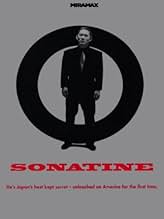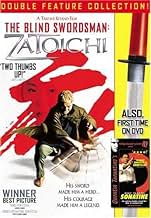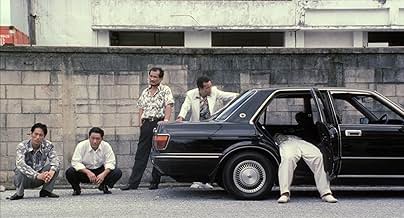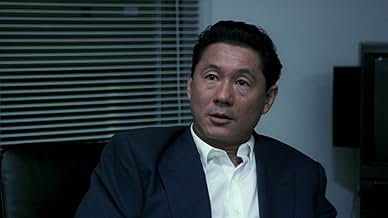Plusieurs yakuzas de Tokyo sont envoyés à Okinawa pour aider à mettre fin à une guerre de gangs. La guerre s'intensifie et les vagabonds tokyoïtes décident de faire profil bas sur la plage.Plusieurs yakuzas de Tokyo sont envoyés à Okinawa pour aider à mettre fin à une guerre de gangs. La guerre s'intensifie et les vagabonds tokyoïtes décident de faire profil bas sur la plage.Plusieurs yakuzas de Tokyo sont envoyés à Okinawa pour aider à mettre fin à une guerre de gangs. La guerre s'intensifie et les vagabonds tokyoïtes décident de faire profil bas sur la plage.
- Réalisation
- Scénario
- Casting principal
- Récompenses
- 4 victoires et 1 nomination au total
Avis à la une
In my opinion either you love this film or you hate it, there is no in between, since its so different from the standard or even great gangster movies of our time . I for myself was mesmerized by its artistic beauty, its compelling acting and its wonderful soundtrack.
By now i have seen Hanabi and all the other Kitano movies, but this remains the best to me..
It begins with very unsentimentalized and nonglorified violence. People hit and kill each other and it isn't much different than toast popping out of the toaster. It is fast, moderately bloody, and there. Kitano doesn't seem to be interested in thrilling us with either the danger, grotesqueness, or thrill of violence--another, not clearly defined agenda is at work here.
At perhaps a third of the way into the film, it makes a sudden transition from this gangster life to a period of forced inactivity. I suspect this section, which is delightfully playful, is at the heart of this film.
In that sense, the internet-famous cover photo of writer/star/director Takeshi Kitano grinning broadly while holding a gun to his head is a precise depiction of the film's themes. These gangland thugs might be all business when they're intimidating store owners or trading bullets with a rival gang (nary an eyelash is batted when Kitano and company dunk a victim for too long and accidentally drown him), but on their down time, they need to cut loose, have a few laughs and make human connections, too. The really interesting points are where those two opposite modes meet, a jolting transformation when light amusement slams into stone-serious reality and all the easy smiles melt. There's always a momentary hesitation where we can't be certain which way the scales will tip, and that's dangerously exciting. Those key moments take time to develop, though, which leads the plot to really sag in the middle.
Kitano performs very well as the central figure, a stark dichotomy of incompatible moods, but he can't be on-screen at all times and isn't always surrounded by the best supporting talent. A strong thematic concept, one which evidently developed live in the field as the script was extremely bare bones, but not especially well-executed. Loaded with promising ideas, much of Sonatine's ephemeral potential depends upon what you, the viewer, are willing to bring to the table.
Le saviez-vous
- AnecdotesThe title Sonatine comes from the musical term sonatina. Kitano said that when learning the piano, when the learner gets to sonatinas they have to decide where they want to go, whether it is to classical, jazz or popular music; marking the point of crucial decision making. This refers to the character Murakawa in the film.
- Citations
Miyuki: You're tough. I love tough guys.
Aniki Murakawa: I wouldn't carry a gun if I were tough.
Miyuki: You can shoot without a second thought.
Aniki Murakawa: I shoot fast because I get scared fast.
Miyuki: But you're not afraid of dying, are you?
Aniki Murakawa: When you're scared all the time, you reach a point when you wish you were dead.
- Crédits fousAt the end of the closing credits, various shots of the beach that were taken a year or so later, are included.
- ConnexionsFeatured in Century of Cinema: Un siècle de cinéma japonais, par Nagisa Oshima (1995)
Meilleurs choix
- How long is Sonatine?Alimenté par Alexa
Détails
Box-office
- Montant brut aux États-Unis et au Canada
- 58 834 $US
- Week-end de sortie aux États-Unis et au Canada
- 17 527 $US
- 12 avr. 1998
- Montant brut mondial
- 58 834 $US
Contribuer à cette page





























